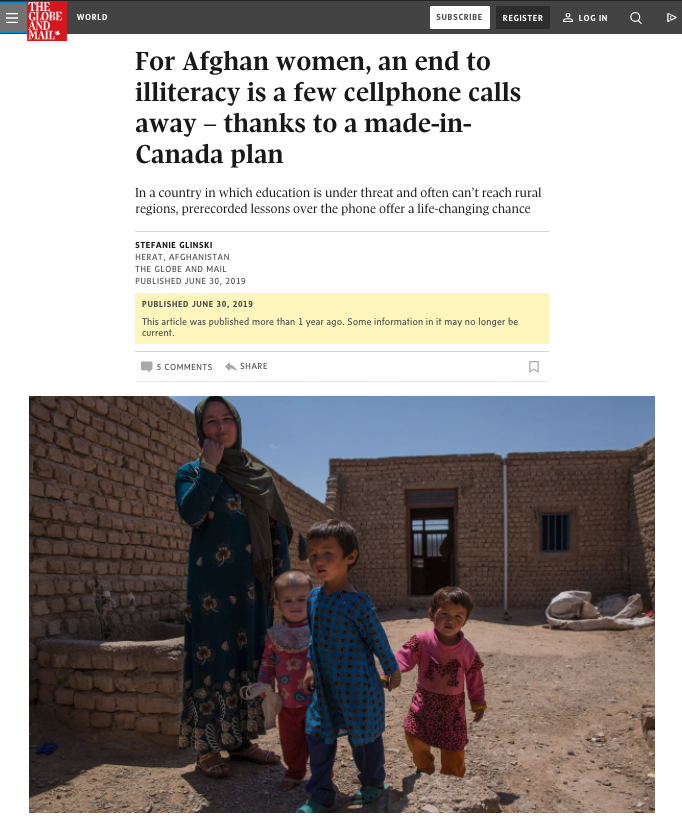PAC M-Learning Project
Learning through Interactive Voice Educational System (LIVES) is research project lead by the Network and Internet Computing laboratory at the University of British Columbia. It is an end-to-end technological solution that bridges the gap between populations with a high proliferation of mobile phones and a learning community that creates and publishes educational material over the telephone. LIVES enables not only the automation of voice-based learning materials, but is also capable of processing test results, feedback and responses through appropriate databases.
Currently, World Vision Afghanistan is implementing this project for two years.
M-Learning provides information to parents about child development.
Child development refers to the changes that occur as a child grows and develops such as being physically healthy, mentally alert, emotionally sound, socially competent and ready to learn.
Recent research confirms that the first five years are particularly important for the development of a child’s brain and shape the child’s future health, happiness, growth, development and learning achievement at school, in the family and community, and in life in general. The first three years are most critical in shaping the child’s brain architecture. Early experiences provide the base for the brain’s organizational development and functioning throughout life. They have a direct impact on how children develop learning skills as well as social and emotional abilities.
Children need love and nurturing to develop a sense of trust and security that turns into confidence as they grow. Understanding the stages of child development helps parents know what to expect and how to best support the child as she or he grows and develops.
Parents in Afghanistan obviously love and want the best for their children but currently aren’t able to provide these things because of the lack of resources available to them. Our project, PAC-M-Learning, will bridge the gap and provide much needed education to these parents.
Our plan is multi-fold:
1) Survey parents in rural parts of Afghanistan regarding their interest in participating.
2) Pick a sample group from the parents surveyed who were particularly keen t0 participate.
3) Partner with a phone company in Afghanistan, which would provide
free airtime on phones to our sample group.
4) Pretest questions regarding the child’s rearing.
5) And finally, the PAC-M-Learning project, which has information about:
- Child’s whole development (physical, cognitive, language, social, and emotional development).
- How to evaluate child’s developmental milestone in the physical, cognitive, language, social, and emotional development of children between ages of (0-5).
- Analysis of child’s development as a whole.
- How to improve child’s development in each domain (physical, cognitive, language, social and emotional development).
- A quiz on the above learning modules.
6) Parents who successfully completed the project would be awarded an honorarium.
7) Post-test questionnaires on completion of the program will determine the effectiveness of the PAC-M-Learning project.
At this time, we are proud to say that the first phase of implementation of this project in Afghanistan is complete. With the help of our M-learning team and guided teachers, sample groups of Afghan parents completed the first M-Learning project and the data collected has been used by our team to write two academic papers, published in 2014. The sum of collected data indicated very positive results and feedback.
Effectiveness of Parent Education through Mobile Technology in Afghanistan Nov 2014
World Vision Afghanistan (WVA) has strategically focused its integrated programing intervention to the wellbeing of children as they hold the future of Afghanistan. As a result, World Vision programs cover education, livelihoods, women empowerment, child protection as well as maternal and child health and nutrition. Accordingly, WVA has been directly implementing various projects on the aforementioned sectors in the three provinces. However, WVA, other agencies and government could not able to adequately reach community members living in an insecure and remote area. As a result, a cooperative agreement was signed on November 2015 between World Vision Afghanistan (WVA) and Partnership-Afghanistan Canada (PAC) to provide a learning opportunity using cost effective and innovative approach.
Throughout 2016, WVA and PAC worked together to develop the necessary documents and approvals to allow Shahnaz Qayumi and Sarah Third of PAC to travel to Afghanistan in order to set up the LIVES technology using SIP. After facing concerns from the Government of Afghanistan regarding the usage of SIP, an alternative plan was created to implement the technology using PRI instead.
In November 2017, after receiving approval, Shahnaz and Sarah travelled to Herat, Afghanistan in order to set up the LIVES Server at the World Vision Headquarters. WVA used LIVES for their positive parenting, health, wash, hygiene, and literacy projects.
We have come dangerously close to accepting the homeless situation as a problem that we just can’t solve.
